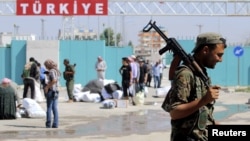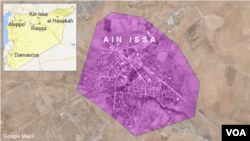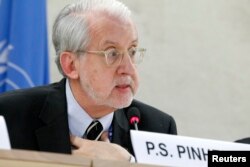Kurdish-led forces in Syria have captured a town once held by the Islamic State group, as they continued to gain ground in their march to the main extremist stronghold in the country.
Backed by U.S.-led coalition airstrikes and some rebel factions, the Kurdish YPG fighters said they seized the town of Ain Issa Tuesday, hours after the Kurds captured a key military base in northern Syria from Islamic State militants.
“YPG and Euphrates Volcano forces completely liberated the strategic town of Ain Issa, located between Hasaka and Aleppo on the international road connecting two parts of Syria today," a spokesman for Kurdish forces, Redur Xelil, told VOA. "We also liberated tens of villages around the town."
The Syrian Observatory for Human Rights reported that Islamic State fighters have completely withdrawn from Ain Issa; Pentagon officials would not confirm Tuesday that Ain Issa and the Brigade 93 military base have been taken over by Kurdish forces.
"This fight here in northern Syria has been an example of ISIL forces breaking under the pressure delivered by coalition airpower and capable and willing ground forces," Colonel Steve Warren, a Pentagon spokesman, said. "We have seen examples of ISIL forces really evacuating, retreating, in some cases just running away."
The advances by the Kurdish fighters in Syria as well as in northern Iraq has been credited largely to a high level of coordination between the ground forces and the nearly year-old air campaign being led by Washington against the Islamic State, also known as ISIS or ISIL in English and by its Arabic acronym, Daesh.
White House Press Secretary Josh Earnest called successes by the Kurds "an indication of how critically important it is for the United States to have a capable, willing and effective partner fighting ISIL on the ground."
That was why the U.S. was dedicating "significant resources" to building up opposition forces, he said. That work was "a more difficult task" in Syria than Iraq, but that "this is a pretty good illustration of why that very difficult work is important," Earnest added.
Taking territory
The capture of Ain Issa would put Kurdish forces and their allies about 50 kilometers (30 miles) from Raqqa, which the Islamic State group considers the capital of its self-declared caliphate that spans across much of Syria and Iraq.
The U.S.-coalition-backed Kurdish fighters recaptured the contested town of Kobane near Turkey early this year and have since been chipping away at IS control in other areas along the border.
“Fighting has been continuing within the borders of Raqqa province for a while," Xelil told VOA. "Our aim is to consolidate our control in the newly liberated town and cities. After our recent operations with the U.S.-led international coalition, the terrorist organization Daesh is in a deep shock. They are very demoralized and weakened, facing some internal conflicts."
To the east, in the provincial capital of Hassaka, Syrian government forces, which control part of the city, clashed with Kurdish rivals in several districts.
Saudi-owned Al Hayat newspaper reported refugees were flowing in and out of the area as battle lines continued to change.
Al Hayat reported some villagers were returning to the border town of Tel Abyad near the Turkish border, retaken by Kurdish fighters from the Islamic State group several days ago. It added that other villagers fled the area near Ain Issa, as Kurdish fighters battled the Islamist extremists.
Elsewhere, there is growing friction between Druze residents in southern Syria and factions trying to capture ground from government forces.
Amateur video showed Druze villagers in the Israeli-occupied Golan Heights town of Majdel al Shams cheering clashes against Jabhat al Nusra militants.
Arab media reported Druze villagers attacked several ambulances carrying militants to a hospital in Israel, resulting in the death of one man.
Druze militia fighters have also reportedly taken sides with Syrian government forces in the southern province of Sweida in recent days, forcing rebel groups to withdraw from the area.
The killings of Druze villagers in the north of Syria several weeks ago ratcheted up tensions between the mostly Sunni rebel groups and Druze in Syria, Lebanon and Israel.
Also, Syrian Interior Minister Mohammed al Sha'ar visited the Iranian capital Tuesday to meet Iranian officials. Syrian state media reported both countries signed a historic agreement to fight “terrorism.”
Analyst Nadim Shehadi, who heads the Fares Center at Tufts University's Fletcher School of Diplomacy, told VOA Iran is trying to burnish its anti-terrorist image in the West.
"Iran and its allies are trying to develop a narrative that they are the main opponents or allies against terrorism and against ISIS globally, and that is trying to woo the West into an alliance with Iran and this will support Iranian hegemonic interests in the region," Shehadi said, using an acronym for the jihadist group.
Civil war's 'devastating effect'
Meanwhile, United Nations investigators said sieges by Syrian government forces, rebel fighters and Islamic State militants are having a "devastating effect" in a conflict that "shows no signs of abating."
Paulo Pinheiro, the head of the U.N.'s commission of inquiry on Syria, told the Human Rights Council in Geneva Tuesday there is little attempt to adhere to international law as most, if not all, of the warring parties carry out indiscriminate attacks in areas populated by civilians.
The result, he said, is a level of trauma that cannot be underestimated.
"Civilians are the main victims of an ever-accelerating cycle of violence," Pinheiro told the council in a forceful statement.
Fighting in Syria has killed more than 220,000 people since the conflict there began in March 2011.
The U.N. estimates more than 12 million people are in need of aid, with the violence sending four million refugees from the country and forcing 7.6 million others from their homes within Syria.
VOA's Jeff Seldin at the Pentagon and Ed Yeranian in Cairo contributed to this report. Some material for this report from AP.







